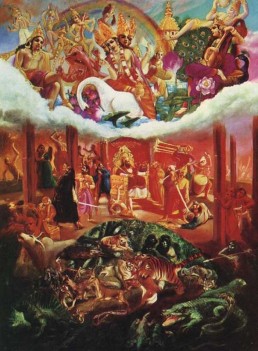The Geeta is written in a conversational style, to remove the tedium unavoidable in the early studies of any philosophy, and to make it more entertaining. In this conversation between the Lord of Perfect Knowledge and the mortal of extreme delusion, Vyasa, the poet, has evidently not forgotten the human element in his philosophical pre-occupation. In any Hall of Knowledge, the questions of Arjuna sound like some childish inquisitive-ness, the play of some intellectual pranks. The patience with which the Lord answers all the questions of the lesser types of intellect, clearly indicated the duties of a true Brahmana in answering exhaustively al the questions raised by the sceptic, nay even by the non-believers.
Even though we are blessed by such a healthy tradition in our literature, somehow, a cruel spirit of secrecy has come to rob this healthy spirit from our glorious culture. Philosophical ideas putrefy when they are not properly ventilated. Every disciple has the full freedom to seek, first of all, to understand properly the logic of the philosophy. Understanding alone can give rise to a true appreciation, and unless we appreciate an idea, we will never be able to live it in our day-to-day life. The Hindu philosophy is a WAY OF LIFE, and therefore, it is essentially to be lived.
Arjuna asks here three definite questions: (1) What are the marks by which a man who has gone beyond the influences of these three gunas can be recognised? and, (2) what would be, in that State-of-Perfection, his relationship with the world outside and how is his behaviour among us who are still under the persecutions of the three gunas? and, lastly, (3) how does such a Man-of-Perfection conquer his inner confusions and entanglements and attain spiritual glory?THE LORD PROCEEDS TO ANSWER ALL THESE QUESTIONS IN THE FOLLOWING STANZAS. FIRST, HE ENUMERATES THE CHARACTERISTIC MARKS BY WHICH WE CAN RECOGNISE ONE WHO HAS CROSSED THE THREE GUNAS:

